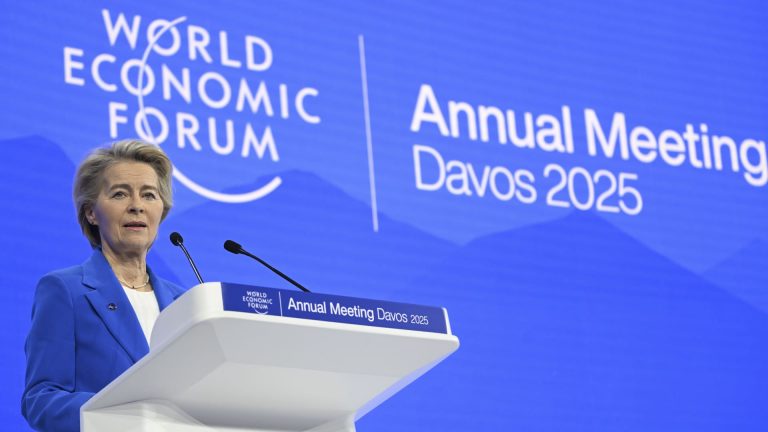DAVOS, SWITZERLAND – JANUARY 21: European Commission President Ursula von der Leyen attends a session during the annual meeting of the World Economic Forum (WEF) in Davos, Switzerland on January 21, 2025. (Photo by Halil Sagirkaya/Anadolu via Getty Images)
Anadolu | Anadolu | Getty Images
The European Union is “open for business” and welcomes global partnerships, European Commission President Ursula von der Leyen said on Tuesday, as the world braces for trade protectionism from new US President Donald Trump.
“Europe will seek cooperation, not only with long-standing like-minded friends, but with all countries with which we share interests,” von der Leyen said during her official speech at the World Economic Forum in Davos, Switzerland. She suggested that when it comes to challenges such as climate change and artificial intelligence, countries must work together even in the face of “tough competition.”
“Our message to the world is simple: if mutual benefits are in sight, we are ready to engage with you. If you want to modernize your clean technology industries, if you want to develop your digital infrastructure, Europe is open for business. ” said Von der Leyen.
The European Commission chief also noted that she is seeing growing interest around the world to engage more with Europe, highlighting the partnerships the bloc has forged with Switzerland, Mexico and the South-South trading bloc. American Mercosur.
Europe seeks to strengthen cooperation with all countries open to collaboration, including partners like the United States, Von der Leyen said, emphasizing the close integration of the American and European economies. For example, she pointed out that many American workers are employed by European companies, and she also highlighted mutual supply chains and trade between the two countries.
“The stakes are high for both sides,” she said. “Our first priority will be to engage from the start, discuss common interests and be ready to negotiate. We will be pragmatic, but we will always remain true to our principles, we will protect our interests and defend our values because that is the European way.”
Questions have been raised about the future of the European Union’s trade relationship with its historic ally Washington, after Trump threatened to impose tariffs on goods from the EU. These measures could have a significant impact on the bloc’s economies.
“Even if some in Europe do not like this new reality, we are ready to face it,” von der Leyen said.
German Chancellor Olaf Scholz, meanwhile, said the United States remained Germany’s closest ally outside of Europe, adding that he would do everything in his power to ensure that remained the case.
In his speech to the World Economic Forum, Scholz said Tuesday that maintaining those relations would be in the mutual interest of the United States and Germany and that close cooperation between the two was “indispensable for peace and security in the world”, according to a WEF. English translation. He also said the country’s partnership was essential for economic development.
Scholz revealed that he had “good early discussions” with Trump, but noted that “at the same time, it is absolutely clear that President Trump and his administration will keep the world in suspense” in various policy areas.
“We are capable and we will handle this, without any excitement or indignation, but also without pretending to get closer and tell them what they want to hear,” Scholz said.
The European Commission’s Von der Leyen also said “we should strive for mutual benefits” when talking with the world’s second-largest economy, China, with which the bloc has previously been at odds over issues of trade and customs duties. Among other measures as part of its long-standing economic measures, the EU imposed tariffs on imported Chinese electric vehicles, while Beijing launched an anti-dumping investigation into brandy from the EU. China has also been the target of Trump’s trade threats.
“2025 marks the 50th anniversary of our union’s diplomatic relations with China. I see this as an opportunity to build and deepen our relationship with China and, where possible, expand trade and investment ties. “It’s time to pursue a more balanced relationship with China,” Von der Leyen said.


